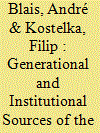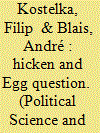| Srl | Item |
| 1 |
ID:
149344


|
|
|
|
|
| Summary/Abstract |
Regret is a basic affect associated with individual choice. While much research in organizational science and consumer behavior has assessed the precedents and consequents of regret, little attention has been paid to regret in political science. The present study assesses the relationship between one of the most democratically consequential forms of political behavior—voting—and feelings of regret. We examine the extent to which citizens regret how they voted after doing so and the factors that might lead one individual to be more regretful than another. Relying on surveys in five different countries after 11 regional and national elections, we find not only that political information leads to a decrease in post-election regret, but also that having voted correctly, or having voted in accordance with one’s underlying preferences regardless of information, similarly mitigates regret. The effect of correct voting on regret is greater among the least informed.
|
|
|
|
|
|
|
|
|
|
|
|
|
|
|
|
| 2 |
ID:
181197


|
|
|
|
|
| Summary/Abstract |
Why has voter turnout declined in democracies all over the world? This article draws on findings from microlevel studies and theorizes two explanations: generational change and a rise in the number of elective institutions. The empirical section tests these hypotheses along with other explanations proposed in the literature—shifts in party/candidate competition, voting-age reform, weakening group mobilization, income inequality, and economic globalization. The authors conduct two analyses. The first analysis employs an original data set covering all post-1945 democratic national elections. The second studies individual-level data from the Comparative Study of Electoral Systems and British, Canadian, and US national election studies. The results strongly support the generational change and elective institutions hypotheses, which account for most of the decline in voter turnout. These findings have important implications for a better understanding of the current transformations of representative democracy and the challenges it faces.
|
|
|
|
|
|
|
|
|
|
|
|
|
|
|
|
| 3 |
ID:
159525


|
|
|
|
|
| Summary/Abstract |
Political scientists, analysts and journalists alike have long believed that the degree of satisfaction with the functioning of democracy determines voter turnout. We use survey data from 24 panel studies to demonstrate that this causal relationship is actually reversed: voter turnout affects satisfaction with democracy. We also show that this reversed relationship is conditioned by election type, electoral system, and election outcomes. These findings are important because: (1) They question conventional wisdom and a large body of scientific literature; (2) They invite a more nuanced approach towards the study of the relationship between evaluations of regime performance and political participation; and (3) They emphasize the vital role of elections in shaping citizens’ perception of the democratic process.
|
|
|
|
|
|
|
|
|
|
|
|
|
|
|
|